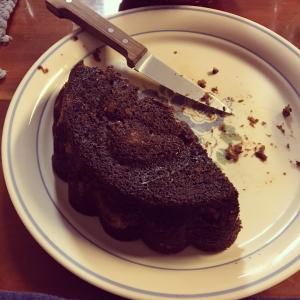Today is the Feast of the Epiphany, that auspicious moment when you begin eating those gorgeous cakes with the little plastic babies hidden inside them, and go on diligently until the beginning of lent. And not just cake—there are the kings, of course, and the bright star, and the house blessings. But what I want to ponder this morning is the business of God revealing himself, in Christ, to the whole world.
As a way in, here is a petulant lamentation. A writing person is annoyed that her young daughter doesn’t want her, the blogging mother, to put stuff about her, the daughter, on the internet. Upon receiving an electronic device for Christmas, the daughter’s first action was to google her mother and then take umbrage over the sheer volume of information and pictures posted over the course of her, at that point, still small life. The writing mother heard her child’s concerns and validated them, but momsplained that she mustn’t be stopped from writing, she mustn’t be inhibited, ultimately, because that wouldn’t be fair. She concludes, “My daughter didn’t ask to have a writer for a mother, but that’s who I am. Amputating parts of my experience feels as abusive to our relationship as writing about her without any consideration for her feelings and privacy.” She will still write about her daughter, but her daughter will have veto power, and so the long day will roil on in self-expressive America.
It’s almost a human right, one might say. The writing person deserves her self-expression, no matter the cost. Expressing herself is the thing that makes her human. Anyone taking it away, even a beloved child, is abusive.
It’s easy for me to laugh, and then to sigh over such a shallow self-justification. I might have said that writing—or any other creative enterprise—is not so much a right as an indulgence. The person who demands her own self-revelation at the expense of everything else is not, probably, going to say anything very interesting. She is a resounding gong, the usual cacophony.
And yet, the deep seed of desire to be seen, to be known, is not something to cast away, or deny. In one way or another, we need for some other person outside of ourselves to see past all the inner clutter into the very heart of who we each are. Light must pierce all the way from the murky outside to the deep, dark inside. And once illuminated, the dark heart desperately wants to know, to understand, that what is there won’t be cast away forever into greater darkness.
It is practically a matter of life or death—ask the people falling off of cliffs while taking selfies. Isolation creeps up, threatening to devour the heart and mind of every single phone owner. If you can’t be known by others, whoever they are, it is hard to think of a reason to go on.
The interesting thing about God, on this important festival day, is that he knew this about us. Indeed, when he was wandering around in that long forgotten garden, looking for Adam and Eve, he knew how lonely they had made themselves. He saw the darkness and understood it. They wanted to know themselves without having to bother to know him. He knew them, and me—better than I would, if I thought about it for any length of time, like—and decided to repair the breach, to go into the darkness and let me know him anyway. Why? Especially as my desire to know myself apart from God is a terrifying rejection of one who deserves no such fate.
Nevertheless, God revealed himself to us, so that we would see him, and know him as he really is, in his mercy and justice, in his love and his perfection. Not so that he could bask in his own knowing glory, which is the the futile business of trying to know each other. The self always has to be the center, and so it is much more important that you know me than that I know you. It is my right to tweet and to posture and to show you those aspects of myself that I most love. And it is your right to meekly push like when I post them. And so in my anxiety for connection, I throw away the thing that would save me.
Getting to know God is a matter of spiritual life or death, of being saved from the terrible isolating fate that I myself, along with the rest of humanity, tried to foist on God. True knowledge of the triune God will save you. That bright, luminous, lustrous knowledge will overturn every corner of your existence. He knew this, and so he revealed himself to the whole world—not to a select few close by, but to the one who was afar off, who was alienated and wandering around looking for everything to devour. That revelation gathered back together the broken, fractured light of the human person’s scribbling, shouting, selfish, needy cry for attention.
If you really get to know Jesus, that knowledge will become the source of your very life. His revealing himself to you illumines all kinds of other ways of knowing that are essential to happiness in the cosmos. He shows you how to know yourself as you really are—dark hearted and helpless, and yet wondrously created with a body and a soul and a mind. He bends your will towards the knowledge of other people—the broken, halting, frustrating, separated way of one person divided from another by the limitations of those very bodies, and yet connected by the perverse commonalities of language, emotions, devotion to cake, and difficult circumstances.
But ultimately, and this is the reason to feast with your whole heart, he lets you see himself ever more clearly. He saves you by the knowledge of himself. If you wander into church this morning, you will surely find him there. And if once you have found him, you will never be alone again.












